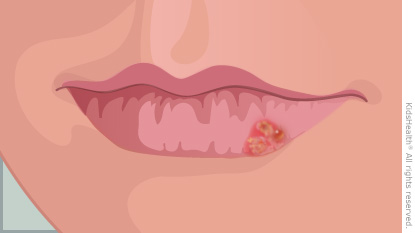Cold Sores: How to Care for Your Child
A cold sore (also known as a fever blister) is a small, painful blister on or near the lips. Cold sores usually go away on their own within 1–2 weeks. Sometimes, prescription medicine is used to help them go away faster. The virus that causes cold sores is contagious, so it's important to help prevent it from spreading.


-
If any medicine was prescribed, give exactly as directed.
-
If your child is uncomfortable, and your health care provider says it's OK, you can give medicines such as acetaminophen (such as Tylenol® or a store brand) or ibuprofen (such as Advil®, Motrin®, or a store brand). Follow the package directions for how much to give and how often. Do not give aspirin to your child or teen, as it has been linked to a rare but serious illness called Reye syndrome.
-
You can give your child ice pops or other cold foods to help ease pain.
-
The virus is most contagious when a person has a cold sore. To help prevent it from spreading to others during this time, your child should:
-
Not share eating or drinking utensils with other people.
-
Keep their toothbrush separate from others.
-
Not kiss other people.
-
Not have intimate or sexual contact with others.
-
Stay away from babies and anyone with a weak immune system.
-
Your child should not touch the cold sore and then their eyes or any other part of the body, because the infection can spread.

Your child:
-
still has a cold sore after 2 weeks
-
isn't eating or drinking because of the pain
-
has signs of dehydration, such as dry lips and not peeing as much as usual
-
gets cold sores often
-
has redness or a cold sore on or near the eye

What virus causes cold sores? A virus called herpes simplex virus type 1 (HSV-1) causes cold sores. People get the virus through close contact, such as kissing or sharing food utensils, towels, or drinks.
Will the cold sores come back? After someone gets infected with HSV-1, the virus stays in their body. Many people carry the virus but only some will get cold sores again. Things like fever, stress, and trauma to the lip can cause cold sores to come back.
How are cold sores treated? If someone has mild cold sores that only happen occasionally, no treatment is needed. For more frequent or severe cold sores, treatment with antiviral medicine can help. The medicine can be taken:
-
at the first sign of a cold sore. For some people, this can be a tingling or burning feeling on the lip. For others, it is when the red blister shows up on the lip.
-
every day to prevent a cold sore from happening.